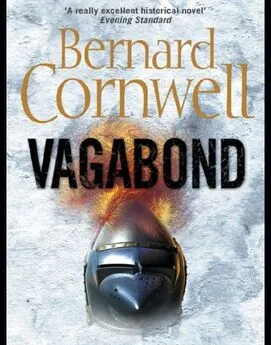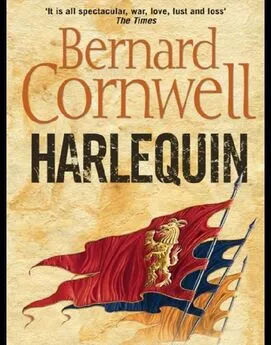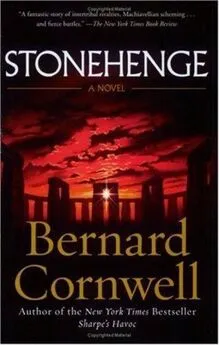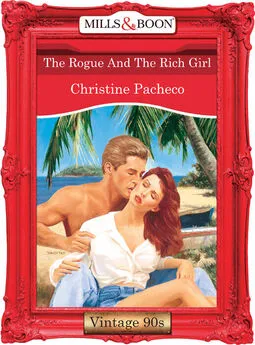Bernard Cornwell - The Grail Quest 2 - Vagabond
- Название:The Grail Quest 2 - Vagabond
- Автор:
- Жанр:
- Издательство:неизвестно
- Год:неизвестен
- ISBN:нет данных
- Рейтинг:
- Избранное:Добавить в избранное
-
Отзывы:
-
Ваша оценка:
Bernard Cornwell - The Grail Quest 2 - Vagabond краткое содержание
In Harlequin, Thomas of Hookton travelled to France as an archer and there discovered a shadowy destiny, which linked him to a family of heretical French lords who sought Christendom′s greatest relic.
Having survived the battle of Crécy, Thomas is sent back to England, charged with finding the Holy Grail. But Thomas is an archer and when a chance comes to fight against an army invading northern England he jumps at it. Plunged into the carnage of Neville′s Cross, he is oblivious to other enemies who want to destroy him. He discovers too late that he is not the only person pursuing the grail, and that his rivals will do anything to thwart him.
After hunting and wounding him, Thomas′s enemies turn him into a fugitive. Fleeing England, he travels to Normandy, determined to rescue Will Skeat, his old commander from Harlequin. Finally Thomas leads his enemies back to Brittany, where he goes to discover an old love and where his pursuers at last trap their reluctant pilgrim.
Vagabond is a vivid and realistic portrait of England at a time when the archer was king of Europe′s battlefields.
The Grail Quest 2 - Vagabond - читать онлайн бесплатно ознакомительный отрывок
Интервал:
Закладка:
But Sir William, his ears ever attuned to the noise of battle, had heard something new. For the last few minutes he had been listening to shouts, clangour, screams and drums, but one sound had been missing and that was the devil's harp music, the deep-toned pluck of bowstrings, but he heard it again now and he knew that though scores of the enemy might have been killed, few of those dead were archers. And now the bows of England had begun their awful work again. 'You want advice, sire?'
'Of course.' The King looked bright-eyed. His destrier, wounded by several arrows, took small nervous steps away from the thickest fighting that raged just paces away.
'Put your visor down,' Sir William said, 'and then pull back.'
'Pull back?' The King wondered if he had misheard.
'Pull back!' Sir William said again, and he sounded hard and sure, yet he was not certain why he had given the advice. It was another damn premonition like the one he had experienced in the fog at dawn, yet he knew the advice was good. Pull back now, pull all the way back to Scotland where there were great castles that could withstand a storm of arrows, yet he knew he could not explain the advice. He could find no reason for it. A dread had seized his heart and filled him with foreboding. From any other man the advice would have been reckoned cowardice, but no one would ever accuse Sir William Douglas, the Knight of Liddesdale, of cowardice. The King thought the advice was a bad jest and he gave a snorting laugh. 'We're winning!' he told Sir William as more blood spilt from his helmet and slopped down to his saddle. 'Is there any danger on the right?' he asked.
'None,' Sir William said. The hollow in the ground would be as effective at stopping an English advance as it had been at foiling the Scottish attack.
'Then we'll win this battle on our left,' the King declared, then hauled on his reins to turn away. 'Pull back indeed!' The King laughed, then took a piece of linen from one of his chaplains and pushed it between his cheek and his helmet. 'We're winning!' he said to Sir William again, then spurred to the east. He was riding to bring Scotland victory and to show that he was a worthy son of the great Bruce. 'St Andrew!' he shouted through thick blood. 'St Andrew!'
'You think we should pull back, uncle?' Robbie Doug-las asked. He was as confused as the King. 'But we're winning!'
'Are we?' Sir William listened to the music of the bows. 'Best say your prayers, Robbie,' he said, 'best say your bloody prayers and ask God to let the devil take the bloody archers.'
And pray that God or the devil was listening.
Sir Geoffrey Carr was stationed on the English left where the Scots had been so decisively rebuffed by the terrain and his few men-at-arms were now down in the bloodreeking hollow in search of prisoners. The Scarecrow had watched the Scots trapped in the low ground and he had grinned with feral delight as the arrows had slashed down into the attackers. One enraged tribesman, his thick folds of swathing plaid stuck with arrows as thick as a hedgehog's spines, had tried to fight up the slope. He had been swearing and cursing, repeatedly struck by arrows, one was even sticking from his skull, which was smothered in tangled hair, and another was caught in the thicket of his beard, yet still he had come, bleeding and ranting, so filled with hate that he did not even know he should be dead, and he managed to struggle within five paces of the bowmen before Sir Geoffrey had flicked his whip to take the man's left eye from its socket clean as a hazel from its shell and then an archer had stepped forward and casually split the man's arrow-spitted skull with an axe. The Scarecrow coiled the whip and fingered the damp on the tip's iron claw. 'I do enjoy a battle,' he had said to no one in particular. Once the attack was stalled he had seen that one of the Scottish lords, all gaudy in blue and silver, was lying dead among the heap of corpses and that was a pity. That was a real pity. There was a fortune gone with that death and Sir Geoffrey, remembering his debts, had ordered his men down into the pit to cut throats, pillage corpses and find any prisoner worth a half-decent ransom. His archers had been taken off to the other side of the field, but his men-at-arms were left to find some cash. 'Hurry, Beggar!' Sir Geoffrey shouted, 'Hurry! Prisoners and plunder! Look for gentlemen and lords! Not that there are any gentlemen in Scotland!'
This last observation, made only to himself, amused the Scarecrow so that he laughed aloud. The joke seemed to improve as he thought about it and he almost doubled over in merriment. 'Gentlemen in Scotland!' he repeated and then he saw a young monk staring cvorriedly at him.
The monk was one of the prior's men, distributing food and ale to the troops, but he had been alarmed by Sir Geoffrey_ 's wild cackle. The Scarecrow, going abruptly silent, stared ‘vide-eyed at the monk and then, silently, let the coils of the whip fall from his hand. The soft leather made no sound as it rippled down, then Sir Geoffrey moved his right arm at lightning speed and the whip struck to loop itself about the young monk's neck. Sir Geoffrey_ jerked the lash. 'Come here, boy,' he ordered. The jerk made the monk stumble so that he dropped the bread and apples he had been carrying, then he was standing close beside Sir Geoffrey's horse and the Scarecrow was leaning down from the saddle so that the monk could smell his fetid breath. 'Listen, you pious little turd,' Sir Geoffrey hissed, 'if you don't tell me the truth I'll cut off what you don't need and what you don't use except to piss through and feed it to my swine, do you understand me, boy?'
The monk, terrified, just nodded.
Sir Geoffrey looped the whip one more time round the young man's neck and gave it a good tug just to let the monk know who was in charge. 'An archer, fellow with a black bow, had a letter for your prior.'
'He did, sir, yes, sir.'
'And did the prior read it?'
'Yes, sir, he did, sir.'
'And did he tell you what was in it?'
The monk instinctively shook his head, then saw the rage in the Scarecrow's eye and in his panic he blurted out the word he had first overheard when the letter was opened.
'Thesaurus, sir, that's what's in it, thesaurus.'
'Thesaurus?' Sir Geoffrey said, stumbling over the foreign word. 'And what, you gelded piece of weasel shit, what, in the name of a thousand virgins, is a thesaurus?'
'Treasure, sir, treasure. Latin, sir. Thesaurus, sir, is Latin for . . .' the monk's voice trailed away. .. treasure,' he finished lamely.
'Treasure.' Sir Geoffrey repeated the word flatly.
The monk, half choking, was suddenly eager to repeat the gossip that had circulated amongst the brethren since Thomas of Hookton had encountered the prior. 'The King sent him, sir, his majesty himself, and my lord the bishop too, sir, from France, and they're looking for a treasure, sir, but no one knows what it is.' 'The King?'
'Or where it is, sir, yes, sir, the King himself, sir. He sent him, sir.'
Sir Geoffrey looked into the monk's eyes, saw no guile and so unlooped the whip.
'You dropped some apples, boy.'
'I did, sir, I did, sir, yes.'
'Feed one to my horse.' He watched the monk retrieve an apple, then his face suddenly contorted with anger. 'Wipe the mud off it first, you toadspawn! Clean it!' He shuddered, then stared northwards, but he was not seeing the surviving Scots of the enemy's right wing scramble out of the low ground and he did not even notice the escape of his hated enemy, Sir William Doug-las, who had impoverished him. He saw none of these things because the Scarecrow was thinking of treasure. Of gold. Of heaps of gold. Of his heart's desire. Of money and jewels and coins and plate and women and everything a heart could ever want.
The sheltron on the Scottish left, rampant and savage, forced the English right so far back that a great gap appeared between the English centre, behind its stone wall, and the retreating division on its right. That retreat meant that the right flank of the central division was now exposed to Scottish attack, indeed the rear of the Archbishop's battle was exposed to the Scots, but then, from all across the ridge, the archers came to the rescue. They came to make a new line that protected the Archbishop's flank, a line that faced sideways onto the triumphant Scottish assault and the swarm of archers drove their arrows into Lord Robert Stewart's sheltron. They could not miss. These were bowmen who started their archery practice at a hundred paces and finished over two hundred paces from the straw-filled targets, and now they were shooting at twenty paces and the arrows flew with such force that some pierced through mail, body and mail again. Men in armour were being spitted by the arrows and the right-hand side of the Scottish advance crumpled in blood and pain, and every man who fell exposed another victim to the bow-men who were shooting as fast as they could lay their arrows on the cords. The Scots were dying by the score. They were dying and they were screaming. Some men instinctively tried to charge the archers, but were immediately cut down; no troops could stand that assault of feathered steel and suddenly the Scots were pulling back, tripping over the dead left by their charge, stumbling back across the pasture to where they had begun their charge and they were pursued every step of the way by the hissing arrows until, at last, an English voice ordered the archers to rest their bows. 'But stay here!' the man ordered, wanting the archers who had come from the left wing to stay on the beleaguered right. Thomas was among the archers. He counted his arrows, finding only seven left in his bag and so he began hunting in the grass for shot arrows that were not badly damaged, but then a man nudged him and pointed to a cart that was trundling across the field with spare sheaves. Thomas was astonished. 'In France we were ever running out of arrows.'
'Not here.' The man had a hare lip, which made him hard to understand. 'They keep
'em in Durham. In the castle. Three counties send 'em here.' He scooped up two new sheaves.
The arrows were made all across England and Wales. Some folk cut and trimmed the shafts, others collected the feathers, women span the cords and men boiled the hide, hoof and verdigris glue while smiths forged the heads, and then the separate parts were carried to towns where the arrows were assembled, bundled and sent on to London, York, Chester or Durham where they awaited an emergency. Thomas broke the twine on two sheaves and put the new arrows in a bag he had taken from a dead archer. He had found the man lying behind the Archbishop's troops and Thomas had left his old torn bag beside the man's body and now had a new bag filled with fresh arrows. He flexed the fingers of his right hand. They were sore, proof he had not shot enough arrows since the battle in Picardy. His back ached as it always did after he had shot the bow twenty or more times. Each draw was the equivalent of lifting a man one-handed and the effort of it dug the ache deep into his spine, but the arrows had driven the Scottish left wing clean back to where it had started and where, like their English enemies, they now drew breath. The ground between the two armies was littered with spent arrows, dead men and wounded, some of whom moved slowly as they tried to drag themselves back to their comrades. Two dogs sniffed at a corpse, but skittered away when a monk shied a stone at them.
Thomas unlooped the string of his bow so that the stave straightened. Some archers liked to leave their weapons permanently strung until the stave had taken on the curve of a tensioned bow, and were said to have followed the string; the curve was supposed to show that the bow was well used and thus that its owner was an experienced soldier, but Thomas reckoned a bow that had followed the string was weakened and so he unstrung his as often as he could. That also helped to preserve the cord. It was difficult to fashion a cord of exactly the right length, and inevitably it stretched, but a good hempen string, soaked with glue, could last the best part of a year if it was kept dry and not subjected to constant tension. Like many archers, Thomas liked to reinforce his bowcords with women's hair because that was meant to protect the strings from snapping in a fight. That and praying to St Sebastian. Thomas let the string hang from the top of the bow, then squatted in the grass where he took the arrows from his bag one by one and span them between his fingers to detect any_ warping in their shafts.
Читать дальшеИнтервал:
Закладка:





![Робин Хобб - Странствия Шута [Fool’s Quest]](/books/1086209/robin-hobb-stranstviya-shuta-fool-s-quest.webp)

